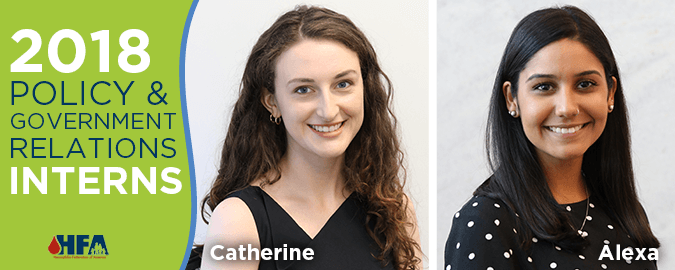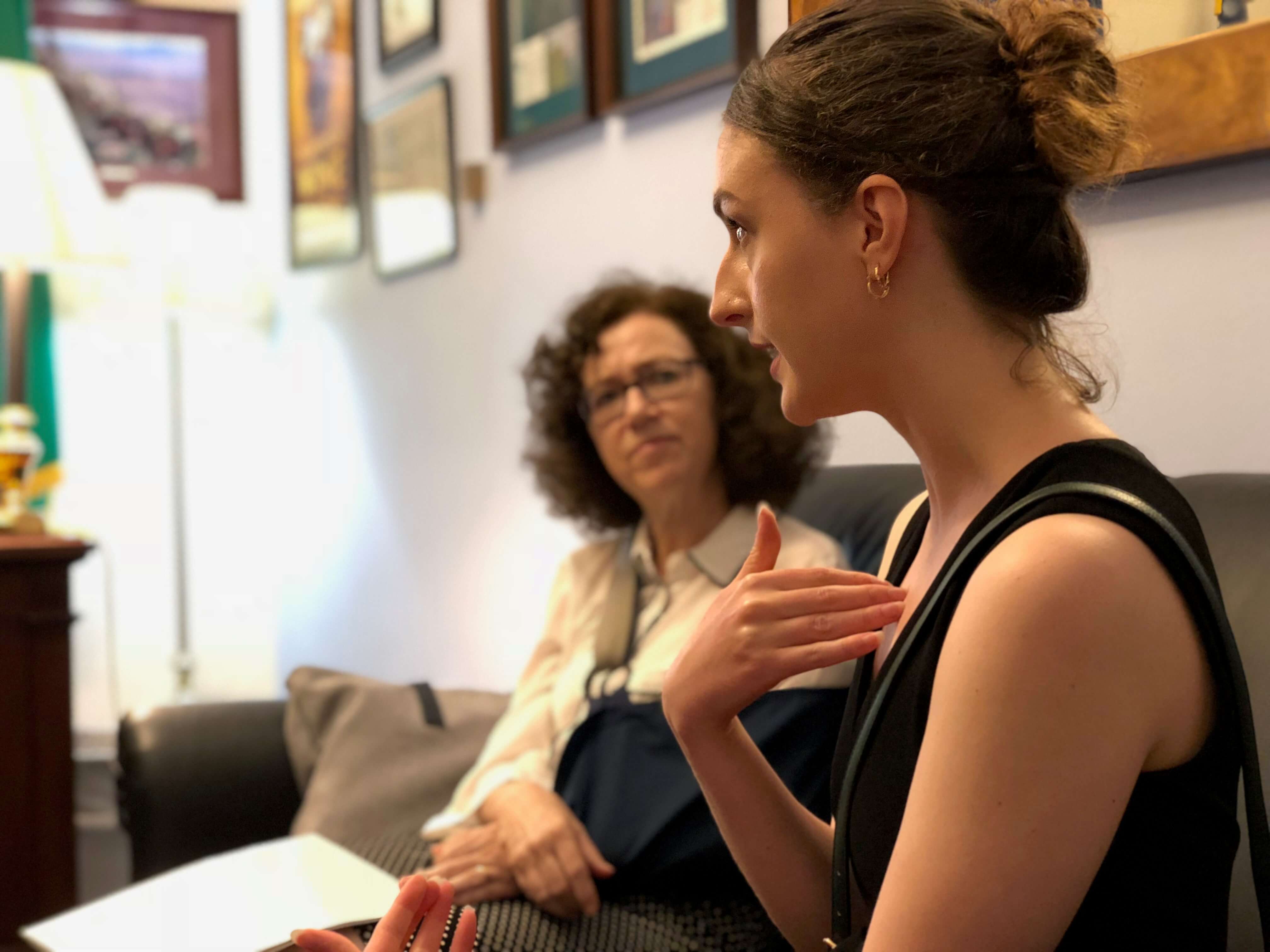
The halfway point of our Policy and Government Relations Internship program is an excellent time for Alexandra and Catherine to reflect on the first five weeks of their internship. In this blog post, Alexandra and Catherine break down what an average week looks like for them as HFA interns and they talk about what the rest of the summer holds for them in D.C.
Catherine: As part of the internship, Alexandra and I have been tasked with writing a research paper on some aspect of federal policy. For my project, I have been exploring the prospect of federal legislation on marijuana and the impacts this might have on the bleeding disorders community. Legalization of medical marijuana has been shown to reduce rates of opioid prescription use – something that could be good news for members of our community who struggle with chronic pain. Some Hemophilia Treatment Centers in states with medical marijuana programs have nearly eliminated opioid prescriptions for pain from their practice. There are concerns about the efficacy and safety of medical marijuana, so it is worth noting that several of the Bills currently introduced in Congress would address the status of marijuana (or its derivatives) as a controlled substance to enable research that would answer these kinds of questions.
As part of the internship, Alexandra and I have been tasked with writing a research paper on some aspect of federal policy. For my project, I have been exploring the prospect of federal legislation on marijuana and the impacts this might have on the bleeding disorders community. Legalization of medical marijuana has been shown to reduce rates of opioid prescription use – something that could be good news for members of our community who struggle with chronic pain. Some Hemophilia Treatment Centers in states with medical marijuana programs have nearly eliminated opioid prescriptions for pain from their practice. There are concerns about the efficacy and safety of medical marijuana, so it is worth noting that several of the Bills currently introduced in Congress would address the status of marijuana (or its derivatives) as a controlled substance to enable research that would answer these kinds of questions.
Though it’s unlikely that a bleeding disorder would make it onto the list of diagnoses for which medical marijuana is approved, our community has been a part of this discussion for more than 30 years. During the HIV/AIDS crisis that decimated the population of people with bleeding disorders, medical marijuana provided relief to some of those suffering from weight loss, lack of appetite and physical pain. I like to think that we are coming full circle in the sense that cannabis could become a scientifically-backed part of combating another crisis – the opioid epidemic – in the United States. In order for that kind of research and regulation to take place, the federal government will have to make steps towards reconsidering cannabis as a controlled substance.
Alexandra:
As Catherine mentioned, one of the assignments for our internship with HFA is to develop a research paper focused on a topic of interest. I have decided to write my paper on Puerto Rico’s health crisis, health outcomes prior to and post-Hurricanes Irma and Maria, and the implications for the bleeding disorders community. Early in 2017, Puerto Rico made national and international headlines for the Zika outbreak, poor health conditions, and a financial debt crisis of more than $120 billion. Following these events, nearly a year ago, Hurricanes Irma & Maria struck Puerto Rico, leaving the island in total destruction. Due to the lack of government funding, medical resources, and a shortage of doctors during this time, many individuals were unable to receive care, treatment, or even visit a nearby doctor. The conditions in which the natural disasters left the island have a clear correlation with the current poor health conditions. However, it is no question that prior to the Hurricanes, the quality of healthcare for Puerto Rican patients was not adequate. Therefore, my paper will specifically compare the quality and access to health care that individuals were given prior to and post-Hurricanes Irma and Maria to determine the root cause of the health crisis.
This paper will be useful to address the needs of the bleeding disorders community in Puerto Rico since the research on our community is limited to non-existent. The bleeding disorders community in Puerto Rico has been marginalized by the lack of awareness and education provided to health professionals on the island regarding bleeding disorders. With just one Hemophilia Treatment Center established in Puerto Rico, patients have struggled to obtain care both before and after the Hurricane. The existing statistics in Puerto Rico seem to undermine the number of individuals living with a bleeding disorder, while also not considering the number of patients who are undiagnosed. On the contrary, those who are diagnosed endure economic and structural barriers that hinder their access receive care and treatment.
Eye on Capitol Hill
Catherine:
In addition to our in-house responsibilities, Alexandra and I keep an eye on what’s happening on Capitol Hill. Throughout the week, we look to see whether any new legislation relevant to our community has been introduced, monitor what is happening in the news, and check the schedules of Congressional committees for upcoming hearings. On average, we have been attending a committee hearing or legislative briefing each week to learn more about the current discussion of healthcare costs in the United States. It is interesting to hear different perspectives from different sources on the healthcare issue and how we can best tackle it. The United States has a comparable rate of healthcare utilization to other developed nations, yet we spend much more money on our healthcare than anywhere else in the world. Though opinions differ on how we can strategize to best lower healthcare spending, there is a consensus within Congress and from third-party organizations that steps must be taken.
Alexandra: Catherine and I meet with our supervisor, Deema, once a week at the office to discuss upcoming events, projects, and further responsibilities. During this time, we have the opportunity to speak about our research papers, state projects, and ask questions on topics that we are uncertain or feel are of importance to our community. This is also a great time for Catherine and me to clarify and raise questions that were addressed at congressional hearings or briefings we have attended that week. Deema provides us with answers, while also guiding us to think critically about the issues that affect our community. In this way, she encourages us to analyze policy matters and come up with innovative ideas to address these problems. The weekly meetings are also a time for us to feel comfortable discussing any issues or concerns that we may experience; whether it is personal or professional, Deema uses this time as a platform for us to speak on any issue.
Catherine and I meet with our supervisor, Deema, once a week at the office to discuss upcoming events, projects, and further responsibilities. During this time, we have the opportunity to speak about our research papers, state projects, and ask questions on topics that we are uncertain or feel are of importance to our community. This is also a great time for Catherine and me to clarify and raise questions that were addressed at congressional hearings or briefings we have attended that week. Deema provides us with answers, while also guiding us to think critically about the issues that affect our community. In this way, she encourages us to analyze policy matters and come up with innovative ideas to address these problems. The weekly meetings are also a time for us to feel comfortable discussing any issues or concerns that we may experience; whether it is personal or professional, Deema uses this time as a platform for us to speak on any issue.
We also partake in bi-weekly meetings with the Policy, Advocacy, Government, Education Team. This is a time for the individuals on this team to speak about projects each person is working on, suggest upcoming training of interest to the team, and provide an update on any policy changes. The first PAGE meeting that Catherine and I were part of was the week following the Patient Fly-In. I was impressed to see how every member of the team was so open to receive constructive criticism on how to improve upcoming events and strengthen the overall work of the team. To be included in these meetings holds great significance to us as interns because we feel appreciated and part of the team. The PAGE team constantly welcomes our feedback and enjoys hearing ideas that we develop as we become more knowledgeable about specific topics.
Catherine:
Looking back, our calendars are covered in markers for hearings, meetings and phone calls – have we really been so busy? It’s surprising to realize that we have been here for more than a month and are already halfway through the internship. As things are beginning to wind down for the congressional summer recess, our final weeks will be more focused on completing our federal policy research and state collaboration projects. With only five weeks left, we look forward to exploring more of the city, enjoying the D.C. heat (while sitting in an air-conditioned room), and continuing to develop our professional skills.



